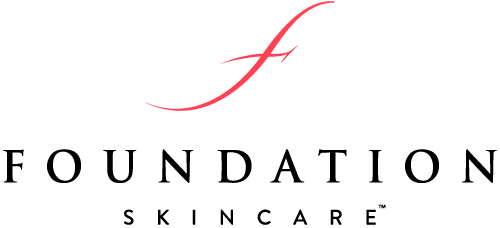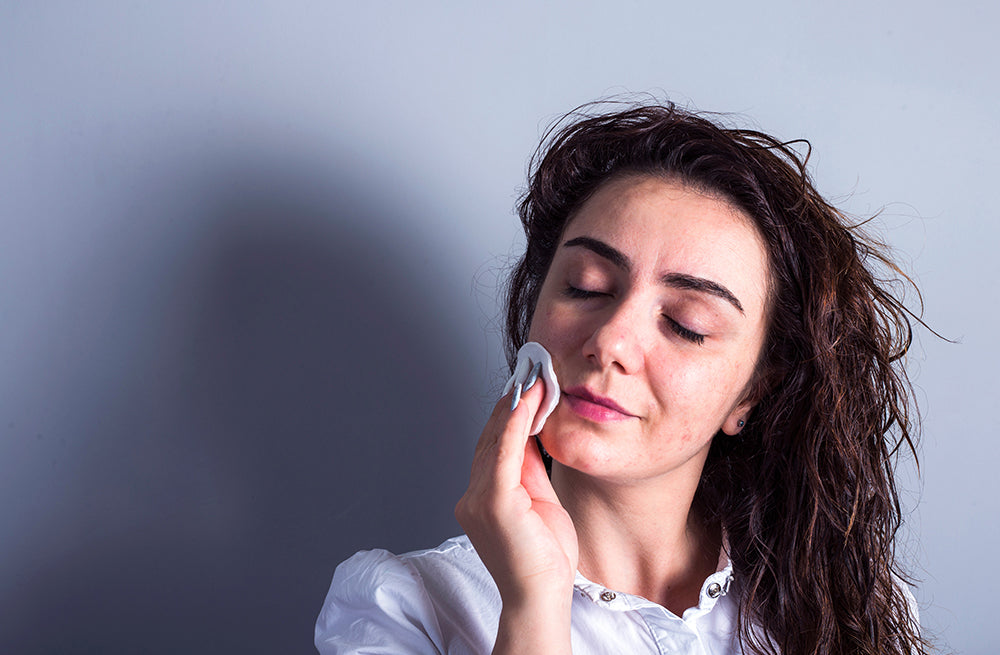As if adolescence weren't challenging enough, adult acne adds an unexpected twist to our older, wiser years. According to Yale Medicine, over 25% of women and 12% of men in their 40s struggle with this so-called teenage affliction.1
But contrary to the misconception that acne is reserved for the hormonal rollercoaster of adolescence, an increasing number of adults find themselves grappling with persistent blemishes, breakouts, and the skincare woes they thought they left behind. Adult acne can be an unwelcome surprise, impacting self-esteem and leaving many searching for prescription solutions. In this article, we’ll explore the causes and complexities of adult acne, prevention tips to consider, and the best types of non-prescription products to achieve clear, healthy skin at any age.
Understanding Adult Acne
Adult acne refers to acne that occurs in people over age 25.2 In general, adult acne is driven by the same factors as acne in adolescents. The primary contributors to acne include heightened oil production, clogged pores, bacteria, and inflammation. But there are also some indirect triggers that contribute to these factors, which we’ll discuss more in detail below.
It’s important to remember that if you struggled with acne in your youth, the treatment approaches you used then may not work as well today. It’s also possible that you may experience acne for the first time as an adult, having sauntered through your teen years blemish-free.
What Are the Most Common Causes of Adult Acne?
Many of the same causes that trigger acne breakouts in teens are at play in adults. Here’s what can trigger acne in adults:
- Stress: While stress does not cause acne on its own, it can exacerbate acne breakouts by messing with your hormones. The stress hormone cortisol impairs the immune system, which slows the wound healing process, making your blemishes look worse and stick around longer than they should.
- Hormones: Fluctuating hormone levels can also trigger breakouts, especially in women. Menstruation, pregnancy, and menopause all increase oil production, and oily skin is the breeding ground for acne. Men taking testosterone may also experience breakouts due to increased oil production.
- Cosmetics: Certain hair and skin products can clog pores or irritate skin, triggering an acne breakout.
- Medication: Acne can sometimes be a side effect of medication like corticosteroids, birth control pills, and anticonvulsants. In these cases, you can ask your doctor about trying a different medication with fewer side effects.
- Genetics: There is some evidence that your family history may also play a role in acne. For instance, a UK study of 400 twin pairs found that 81% of acne was due to genetic factors.3
- Diet: According to experts at Harvard, certain foods can promote inflammation throughout the body, triggering acne outbreaks in adults.4 Some foods thought to cause acne include milk, foods high in sugar, and whey.
Hyaluronic Acid Lotion
• Helps protect, repair & heal the skin
• Anti-inflammatory ingredient benefits
Adult Acne Prevention and Management Tips
One of the first steps you should take in preventing acne is to figure out what’s triggering your breakouts. If it’s stress, you may benefit from therapy, exercise, mindfulness techniques, and other stress-busting activities. If it’s a certain medication, ask your doctor about switching to another. Some other ways to prevent and manage adult acne include:
- Cleanse your face twice a day with a gentle cleanser.
- Avoid harsh cleansers and face oils.
- Pat your skin dry.
- Remove makeup before going to bed.
- Wash your pillowcase regularly.
- Follow a healthy diet and avoid inflammatory foods and excess sugar.
- Try not to touch your face, especially if you have not washed your hands.
- Never pop pimples.
How Lifestyle and Habits Contribute to Acne in Adults
Beyond what you eat and how well you deal (or don’t deal) with stress, there are a number of other ways that your lifestyle and habits may be contributing to your acne breakouts. These include:
- Not getting enough sleep: Inadequate sleep can disrupt hormonal balance and increase stress, causing excess oil production and breakouts.
- Too much phone time: Holding your phone up to your face on a regular basis is bound to transfer dirt and debris to your skin, causing acne along the sides of your face. Be sure to clean your phone regularly and avoid holding it up to your face excessively.
- Smoking: Smoking isn’t just bad for your lungs–it’s also bad for your skin. Your skin absorbs nicotine and other chemicals from cigarettes, which change the composition of skin oils and clog pores.5
- Drinking: Like stress, drinking also weakens the immune system, which can exacerbate and prolong acne breakouts. It can also contribute to systemic inflammation throughout the body.
Best Products to Use for Adult Acne
Whether you’re struggling with a current breakout or trying to prevent another one, these are the best products to use for adult acne:
- Foundation Skincare Azelaic Acid 14% Cream: Azelaic acid, a natural acid present in grains like barley, wheat, and rye, offers antimicrobial, anti-inflammatory, and antioxidant benefits. It is recommended for acne, hyperpigmentation, and rosacea due to its ability to reduce inflammation, brighten skin, and unclog pores. In clinical studies, topical azelaic acid proved as effective as tretinoin, benzoyl peroxide, erythromycin, and oral tetracycline for acne treatment, while being gentler on the skin.6 Foundation Skincare Azelaic Acid Cream, with a potent 14% concentration, is a non-prescription option formulated to be gentle enough for sensitive skin. In addition to clearing up acne, it promotes collagen production for faster skin healing. Apply once or twice daily as the final step in your skincare routine, and consider combining with niacinamide.
- Foundation Skincare Niacinamide Lotion 10%: Niacinamide, a Vitamin B-3 variant, is vital for skin protein synthesis and moisture retention. It prevents acne by supporting the skin's lipid barrier and reducing oil production, while its anti-inflammatory properties alleviate redness and enhance skin texture. Foundation Skincare Niacinamide Lotion 10%, with a potent 10% concentration, includes hyaluronic acid and ceramides for extra hydration. It also features aloe leaf juice to further soothe the skin.
- Foundation Skincare Vitamin C Lotion 20%: You may think of vitamin C when battling a cold, but the vitamin is just as beneficial for your skin as it is for your immune system. Vitamin C diminishes redness and swelling, promotes collagen for scar healing, and is particularly effective for atrophic scars lacking collagen production. Clinical trials show twice-daily application of Vitamin C reduces acne lesions without significant side effects compared to a placebo.7 Foundation Skincare Vitamin C Lotion 20% blends a high concentration of the active ingredient with a moisturizing base and vitamin E to hydrate, brighten, and protect skin. Beyond inflammation reduction, it also addresses fine lines and wrinkles while gently exfoliating.
- Foundation Skincare Night Renewal Cream with 2% Granactive Retinoid: Foundation Skincare Night Renewal Cream, featuring 2% Granactive Retinoid, essential peptide growth factors, and plant-based botanicals, supports skin renewal with the benefits of prescription retinoic acid minus the irritation. Renowned for anti-aging effects, retinoids are also recognized by dermatologists as a key acne therapy due to their potent anti-inflammatory properties. They also unclog pores and help to reduce oil secretion while healing acne scars. Given retinoids increase skin sensitivity to the sun, use Foundation Skincare Night Renewal Cream exclusively at night. Start with three nights per week, gradually transitioning to nightly use as your skin adjusts.
Related Articles: Hormonal Acne: How to Prevent Breakouts, What Your Acne Location Says About the Cause, Top 5 Skincare Products for Acne & Scarring
When to Seek Professional Help
If you have persistent or severe acne, scarring, or you suspect you have an underlying health condition, it’s wise to consult your dermatologist for guidance. Adult acne can take a toll on your emotional health, but with the right strategy in place, you can find a clear path to clearer, healthier skin.
Find more resources and tips on dermatologist-formulated skincare in the FS Journal.
References:
- https://www.yalemedicine.org/conditions/acne
- https://www.health.harvard.edu/blog/adult-acne-understanding-underlying-causes-and-banishing-breakouts-2019092117816
- https://www.news-medical.net/health/Genetics-of-Acne.aspx
- https://www.health.harvard.edu/blog/does-diet-really-matter-when-it-comes-to-adult-acne-2020081920726
- https://www.verywellhealth.com/is-smoking-cigarettes-a-cause-of-acne-15687
- https://pubmed.ncbi.nlm.nih.gov/1712709/
- https://www.health.harvard.edu/blog/why-is-topical-vitamin-c-important-for-skin-health-202111102635





